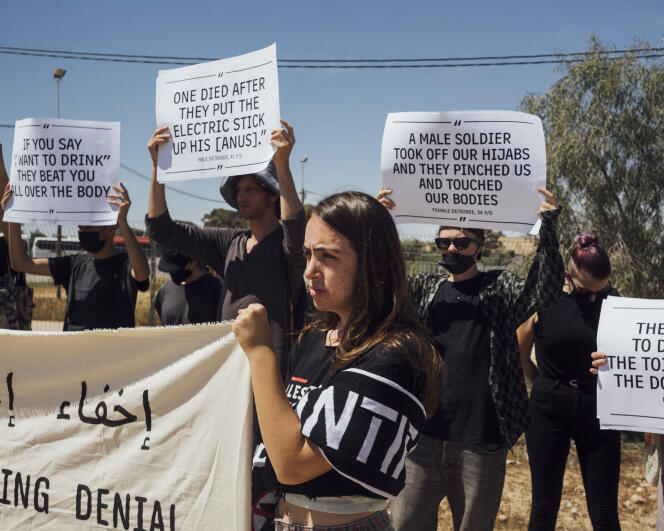


On October 7, 2023, Israel experienced the worst terrorist attack in its history. Of the approximately 1,200 Israelis killed by members of Hamas and its affiliates that day, 800 were civilians; and 252 people were kidnapped. The attack also took place at a time when the country was led by the most radical, anti-Palestinian government since its creation in 1948, with far-right figures such as Bezalel Smotrich (the Finance Minister) or Itamar Ben-Gvir (the National Security Minister). October 7 was the starting point for an ongoing brutal war and unprecedented reprisals, even in Israeli prisons.
The details of this repression are gradually emerging, and the in-depth investigation carried out by Israeli human rights organization B’Tselem, published on Monday, August 5, has revealed its mechanisms. It is based on the detailed, verified and cross-checked testimonies of 55 former detainees, collected for the most part in person, sometimes by telephone.
Implementation of ‘a racist ideology’
The NGO pointed out that prisons “have always served […] as a tool for oppressing and
dominating the Palestinian population.” Since 1967, Israel has imprisoned some 800,000 Palestinians from the West Bank, Gaza and East Jerusalem – or 20% of the total population. The situation has worsened under the current government, particularly with Ben-Gvir, Minister of National Security, who has authority over prison administration. He has taken measures limiting family visits, and early release opportunities, even to the point of prohibiting prisoners from preparing their own meals.
For B’Tselem, the October 7 attack “provided [Israel] an opportunity to press harder with
applying their racist ideology, using the oppressive mechanisms at their disposal,” including Israeli prisons. From that day on, the fate of Palestinian prisoners changed. The prison administration implemented a form of lockdown and cut the inmates off from the outside world. On October 18, 2023, Ben-Gvir declared a “state of prison emergency.”
For the NGO, this was the start of “a rushed process in which more than a dozen Israeli prison facilities, both military and civilian, were converted into a network of camps dedicated to the abuse of inmates.”
“Such spaces, in which every inmate is intentionally condemned to
severe, relentless pain and suffering,” continued the report, “operate in fact as torture camps.”
9,623 Palestinians incarcerated
Testimonies recount the abuses in great detail, dividing them into three categories – violation of prison protocols, physical and psychological violence and deprivation of adequate living conditions.
You have 52.72% of this article left to read. The rest is for subscribers only.
This post was originally published on this site be sure to check out more of their content.






